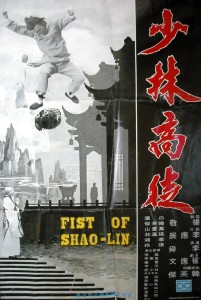Fist of Shao-Lin
少林高徒
Taiwan, 1974, colour, 2.35:1, 87 mins.
Director: Li Shun 李舜.
Rating: 7/10.
Enjoyable, above-average revenge story is not simply concerned with providing excuses for combat.
Donghua county, China, Republican era. After 12 years away studying Shaolin martial arts, Ding Zhigang (Bai Ying) returns home to find the man who murdered his father and family. Among his clues are the name Qin Biao and some deadly metal slivers. After attracting attention during a fight, Ding Zhigang is offered a job by Li (Han Yingjie), head of the local famine relief committee, to guard the rice shipments on the way to the nearby refugee area. Using the name Qin Wanli, Ding Zhigang accepts and moves into Li’s home, where he gets to know his wastrel son (Wan Zhongshan) and pretty daughter (Sun Jialin). Ding Zhigang gradually comes to suspect Li is not all he seems – especially as Li’s watch bears a strong resemblance to his late father’s, though he doesn’t yet know that Li has been switching the good rice sent by the government for lower-grade rice. When Li discovers Ding Zhigang’s real identity, he orders his son to kill him.
REVIEW
This, the best of three martial arts films distributed here [in the UK in 1975] by Transit – the others being The Fist of Justice 半斤七两 (1973) and Return of the Dragon [UK title of Infernal Street 七煞街, 1973] – deserves especial mention for several reasons. First, and perhaps foremost, given the condition here of Chinese films, because its technical aspects are of the highest quality – equal, in fact, to any European or American production. Second, because it is an excellent example of the work being done independently of the two “giants”, Shaw Brothers and Golden Harvest. For budgetary reasons and lack of studio space, independent productions are virtually always shot entirely on location: this gives many a more “natural” look, as well as providing opportunities for varied uses of landscape. Visually, Fist of Shao-Lin 少林高徒 falls midway between the two house-styles, with a lack of accentuation in colour and lighting that many may welcome. The print distributed here [in the UK] is complete apart from some negligible censor trims; the dubbing is above-average, and the colour processing superb.
The plot follows the customary formula of filial revenge, this time featuring Ding Zhigang who learns the Shaolin martial arts in order to pursue the murderer of his father and entire household 12 years earlier. Characterisation, particularly from the villain, is acute without being over-histrionic – something which goes for all aspects of the film as a whole. Again, personal weaponry is used as convenient shorthand: [villain] Qin Biao’s speciality is a fistful of metal slivers hurled in fan formation, and his talents at disguise and deceit are equally slick. The fights in general have a relaxed quality which chimes well with their almost casual insertion; for once, the plot is not simply concerned with providing excuses for combat. Ding’s progress towards uncovering the villain Qin is slow and hesitant, with the latter generally coming off best along the way (Ding even undergoes acupuncture for his wounds); interestingly, Ding feels obliged to perfect his opponent’s skill at fan-hurling before they can meet as equals in combat.
The photography and music score, as already said, are uncommonly good, the latter well integrated and free from any cod associations, the former including some genuine night-work and ravishing landscapes (note the silhouette shot of children driving hoops along at nightfall). And yes, the film is also thoroughly enjoyable.
CREDITS
Produced by Forward Motion Pictures (TW).
Script: Yang Yingwen. Photography: Lin Zirong. Editing: Jiang Sou. Music: Wu Dajiang. Art direction: Zhang Linwang. Costumes: Qin Dafu. Sound: Zhang Hua. Action: Du Weihe.
Cast: Bai Ying (Ding Zhigang/Qin Wanli), Han Yingjie (Qin Biao/Li), Wan Zhongshan (Li Junjie, Li’s son), Sun Jialin (Li Yuanqing, Li’s daughter), Li Xiang (He Lihua), Zhang Ling (Sun Xiu’er), Long Fei (Jin Hu), Ge Xiangting (Sun Baoyin, Sun Xiu’er’s father), Cao Jian (Ding Yiming), Wang Yu (Old Hua), Lin Xiaohu (young Ding Zhigang), Xue Han (Zhao Long), Xie Xing (He Jiang), Ge Xiaobao (Xiao’er), Lin Lin (Wu Yanfang), Xi Bao (Xiaosan), Jiang Han.
Release: Taiwan, 6 Jun 1974.
(Review section originally published in UK monthly films and filming, Jun 1975, as Fist of Shao Lin. Modern annotations in square brackets.)
